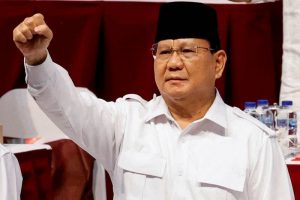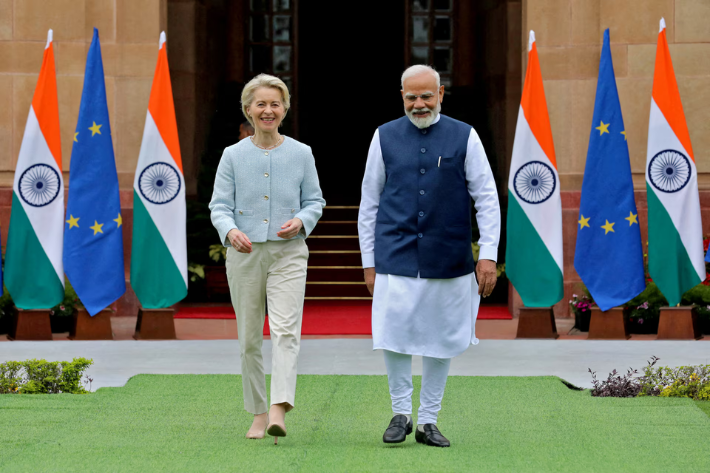China pushed its Southeast Asian neighbours on Monday for stronger economic ties and more open trade at the regional summit in Malaysia, after US President Donald Trump grabbed the spotlight on Sunday – then flew north to Japan.
The US leadership appeared to settle for small outcomes on the first day of President Trump’s five-day tour of East Asia. He won a lot of attention, and was part of another peace deal, but for some, it was “toothless” summit, with shallow deals because few leaders have the time needed to sit down to resolve deep differences.
And while Treasury Secretary Scott Bessent negotiated what sounds like a very basic trade agreement with his Chinese counterpart He Lifeng, Trump was free to focus on less important goals – signing trade and mineral deals with four Southeast Asian countries on Sunday.
ALSO SEE: Trade Deal Optimism Lifts North Asian Stocks to Fresh Peaks
Before leaving, Trump oversaw the signing of an expanded ceasefire pact between Thailand and Cambodia, plus trade deals and agreements on critical minerals with Cambodia, Malaysia, Thailand and Vietnam.
But none of those framework deals reduced steep US tariffs on the ASEAN nations, the White House said, though they left room for some exemptions.
“Our message to the nations of Southeast Asia is that the United States is with you 100% and we intend to be a strong partner for many generations,” Trump said.
This came on the same day that US and Chinese negotiators agreed to a tariff pause in their trade war.
That announcement suggests the deal that Trump could sign with China’s President Xi Jinping later this week – if they get that far – could simply be a relatively lightweight document that hacks threatened US tariffs, pauses ramped-up controls imposed recently by Beijing on rare earths for a year, and deals with one or two other small issues, such as the takeover of TikTok’s operations in the US.
Critics are already complaining that the much-suspected outcome appears to step around a range of heavyweight issues that the two sides are deeply at odds about, such as China’s state subsidies and industrial overcapacity, which will have to be dealt with at a later date, or attempted by other braver souls (dare we say, European leaders?).
China and other states seek to boost ties
And while Trump and Secretary of State Marco Rubio flew off to Tokyo, top officials from China and the leaders of Brazil, Canada, the European Council and the 11-strong ASEAN bloc sought to solidify economic partnerships and hammer out trade pacts.
Two lower-profile US officials were left at the summit in Kuala Lumpur after Rubio’s departure, and Chinese officials were expected to press for lower barriers and anchoring measures under World Trade Organization rules while seeking to shore up regional ties.
At a meeting of ASEAN members with China, Japan, and South Korea, Chinese Premier Li Qiang called for all parties to uphold free trade and oppose protectionism, a phrase China has used to call out Trump’s tariffs.
“We must fully safeguard the hard-earned peace and stability in East Asia,” Qiang said in a summary of remarks from state media.
He urged countries to “uphold free trade and the multilateral trading system, oppose all forms of protectionism, and continuously advance regional economic integration,” Reuters reported.
Concern over China’s territorial claims
The China-backed Regional Comprehensive Economic Partnership, comprised of 10 ASEAN nations with Australia, Japan, New Zealand and South Korea, also called for wider trade efforts and faster addition of new members in its first summit since 2020.
The world’s largest trading bloc, RECP covers about 30% of global gross domestic product and is touted by some analysts as a potential buffer against US tariffs.
But China’s leadership attempts at a summit that features Brazilian President Luiz Inacio Lula da Silva and Canadian Prime Minister Mark Carney, among other world leaders, could face resistance among concerns about its rising military ambitions.
Philippines President Ferdinand Marcos Jr criticised Beijing’s actions in the South China Sea, a busy waterway in which Malaysia and Vietnam also have territorial claims.
“It is regrettable that incidents continue to occur … which endanger the lives of Philippine personnel and compromise the safety of our vessels and aircraft,” Marcos said of a series of confrontations there.
In response to Marcos’ comments, China’s foreign office said the “Philippine side’s deliberate violation of rights and provocation at sea is the source of tension.
EU concern on China’s latest rare earth curbs
European Council President Antonio Costa met Chinese Premier Li Qiang and said he conveyed strong concern about Beijing’s expansion of export controls on critical raw materials.
“I urged him to restore as soon as possible fluid, reliable and predictable supply chains,” Costa said after the meeting, adding that he had also sought China’s help for efforts to end Russia’s war in Ukraine.
Rare earth magnets and minerals have been a major sticking point in Beijing’s trade war with Washington, with China using its control over 90% of global supply as leverage to combat US tariffs.
Japan’s foreign ministry also voiced concern over China’s curbs and questioned Beijing’s rhetoric on wider trade.
“They have imposed or tried to impose export restrictions on rare earths that have had a great impact on the supply chain, not only for Japan, but also for the entire world,” spokesperson Toshihiro Kitamura said.
“China is very powerful, a big country in terms of economy, and they try to make use of these US tariff issues in order to pretend as if they are the guardian or champion of the free trade system.”
Wins for Lula, East Timor
Brazilian President Luiz Inacio Lula da Silva said his meeting with Trump on Sunday “guaranteed” a better trade deal than the current 50% tariff on Brazilian goods.
“I told him it was extremely important to take into account Brazil’s experience as the largest country in South America, as the most economically important country that has almost all of South America as a neighbour,” Lula, as he is popularly known, said on Monday.
One of the happier moments at the summit was the addition of ASEAN’s 11th member state, East Timor, which Prime Minister Xanana Gusmao described as “a dream realised” for his tiny nation of just 1.4 million people.
Video clips of the East Timorese delegation crying and thanking Asean attendees went viral online.
The Association of Southeast Asian Nations (ASEAN) now groups Brunei, Cambodia, Indonesia, Laos, Malaysia, Myanmar, the Philippines, Singapore, Thailand, Vietnam, and East Timor (also known as Timor Leste).
- Jim Pollard with Reuters
ALSO SEE:
Japan’s New PM to Meet Trump, ‘Will Buy US Soybeans, Pickups’
US Sanctions Force Indian, Chinese Refiners to Cut Russian Oil
Oil and Gas Firms, Governments Silent on Methane Leaks, UN Says
US, Australia Sign $8.5bn Deal on Rare Earth, Gallium Projects
Cybercrime Epidemic Casts Shadow on ASEAN as Summit Looms
Nikkei Soars, Yen Sinks After Takaichi Picked as Japanese PM
China Says TikTok Framework Agreement is a ‘Win-Win’ Deal
























